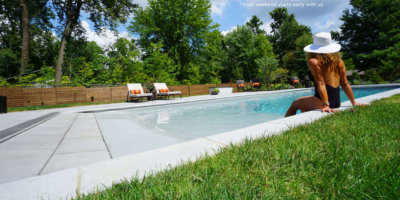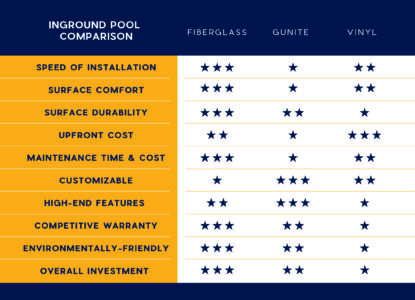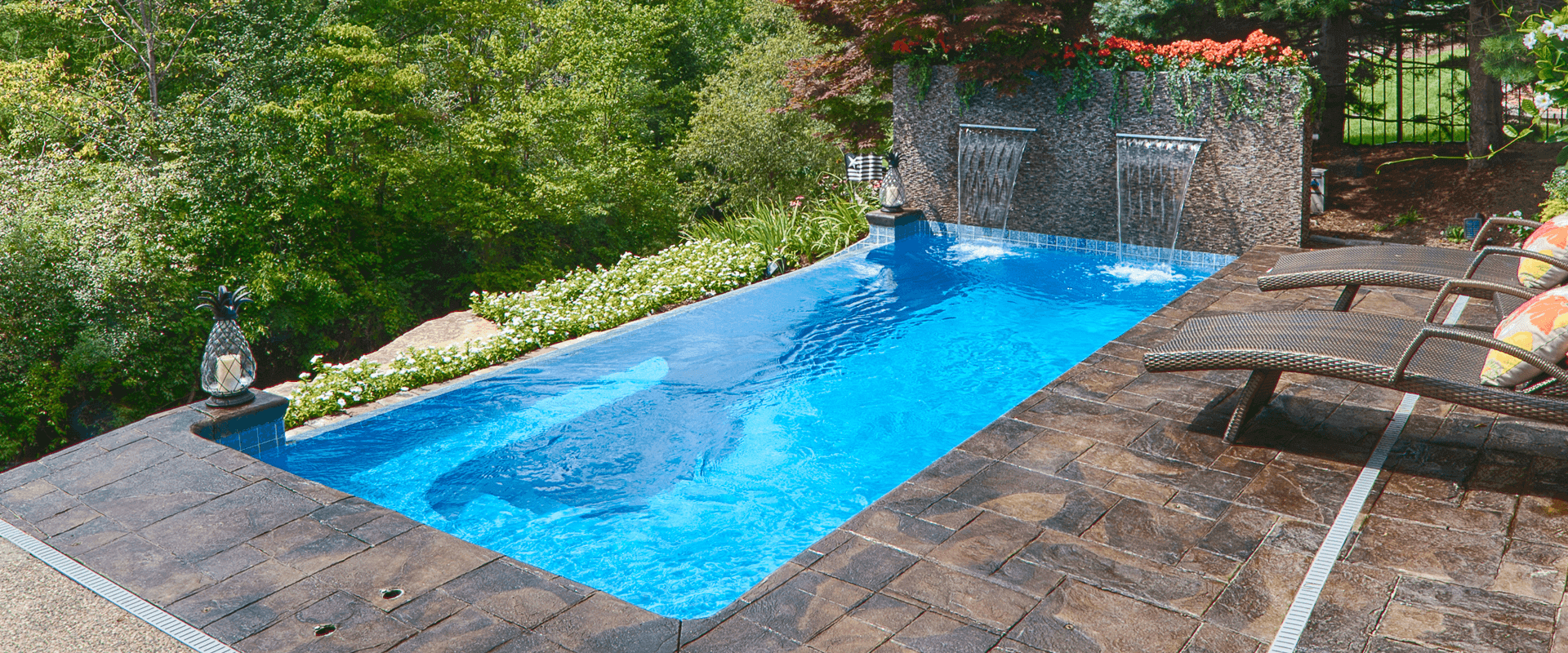877-929-7665
How Much Does a 16×32 Inground Pool Cost?

When planning to buy an inground pool, the size of the pool is an important factor that influences how you use the rest of your outdoor space. The pool’s footprint can determine if there’s enough room for additional features. A popular pool size, 16 x 32, is often the top choice for homeowners with medium to large yards as they still allow room to integrate extras such as seating areas, outdoor kitchens, and maybe even a putting green. Naturally, your next question may be, “What does a 16 x 32 inground pool cost?” Let’s discuss how to get a ballpark estimate.
Understanding How Builders Estimate Inground Pools Prices
One of the first things a homeowner should know is that builders estimate each pool differently depending on the material type. The difference in measurement units—square feet for vinyl and gunite pools versus linear feet for fiberglass pools—arises mainly from how these pool types are constructed and estimated.
Vinyl and Gunite Pools (Square Foot):
- Construction Approach: Vinyl and gunite pools are built directly on-site, providing the flexibility to create nearly any shape or size tailored to the homeowner’s vision.
- Square Foot Estimation: These pools may be irregularly shaped due to their custom nature, so builders calculate the total surface area when estimating costs. Estimates include material costs—like the vinyl liner or concrete used in gunite pools—and factors in the complexity of the construction process.
- Pricing Factors: The pool’s square footage significantly determines the required material and labor and the cost of integrating complex features such as built-in steps or tanning ledges.
Fiberglass Pools (Linear Foot):
- Construction Approach: Fiberglass pools are manufactured as prefabricated units in various shapes and sizes and are then transported and installed at the pool site.
- Linear Foot Estimation: Pricing for fiberglass pools often depends on the pool’s length. The length affects installation, transport, and site preparation costs. With fewer variables than custom-built pools, fiberglass pool pricing estimation is less complex.
- Pricing Factors: The extent of excavation, backfilling, and coping required affects fiberglass pool prices. Since fiberglass pools are pre-shaped and built, surface area measurements are more predictable than those of custom vinyl or gunite pools.
Average Pricing for a 16 x 32 Pool by Pool Type
With a better understanding of how pool builders price pools, let’s discuss the formulas and corresponding inground pool cost estimates.
16 x 32 Vinyl Pool Cost: $61,500
According to HomeGuide’s 2024 pricing guide, vinyl liner pools average $123 per square foot, putting a pool that is about 500 square feet around $61,500.
16 x 32 Fiberglass Pool Cost: $64K
If you are interested in a fiberglass inground pool, we recommend estimating the initial cost at $2Kper linear foot. So, a 16 x 32 inground fiberglass pool’s ballpark estimate is 32′ x 2K = $64K.
16 x 32 Gunite Pool Cost: $89,600
According to the renovation calculator site, renotag, gunite pools average $175 per square foot; therefore, a 16 x 32 gunite pool may cost around $89,600.
Other Cost Factors to Consider
Naturally, these numbers don’t cover every situation. For instance, the cost of a pool in a coastal Florida region might be different from that of a pool in a mountainous Colorado area due to variations in local regulations, environmental conditions, labor costs, and material availability. Each location has unique factors that can influence the overall cost of installing a pool. A checklist of other items you may consider in developing your cost picture includes:
- Driveway Repair
- Association Fees or Permits
- Crane Rental
- Landscaping
- Retaining Walls
- Pool Heater
- Automatic Vacuum Systems
- Dirt Hauling
- Slides or Waterfalls
- Saltwater Option
- Generator
- Specialty Tile
- Led Lights
- Bubblers or Deck Jets
- Spas
Which Pool Type is Best for You?
We strongly appreciate fiberglass pools, but it’s essential to consider all your options to make an informed decision. A 16 x 32 inground pool offers various benefits depending on the type you choose. For instance, gunite pools are ideal if you’re looking for a long-lasting option that can fit unique or complex yard shapes. They are also particularly well-suited for expansive properties where custom features and designs are popular. Conversely, you may prefer vinyl pools if you’re aiming for the lowest upfront cost (over the life of the pool, vinyl costs can add up). Each type has its advantages, and considering your specific needs and circumstances will help you make your decision. Here’s a quick reference to some of the pros and cons of each type of inground pool.
None of the pool types has three stars across the board in our comparison chart. It’s a question of what’s most important to you. Two of the biggest surprises for some buyers are fiberglass’s high marks in “durability” and “surface comfort and safety.” Fiberglass looks so shiny that some mistakenly link it to plastic and worry that it will be brittle and slippery. The fact is that multilayered fiberglass is incredibly durable, and the attractive gelcoat provides a comfortable, non-snag/non-skid surface!

Need More Tools for Your Quest?
When evaluating fiberglass inground pools, use tools like the Thursday Pools free pool cost calculator, print out our pool cost checklist, and consult a dealer. Every installation is unique, and a dealer can be a great resource in highlighting cost factors specific to your locale, such as site preparation, access issues, fencing, restoration, dirt hauling, or electrical work. The investment in an inground pool can be substantial, but it’s a worthwhile investment in your lifestyle—creating a backyard retreat where unforgettable moments with family and friends can unfold daily!
